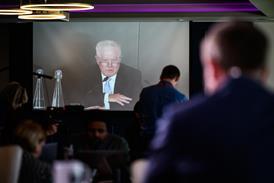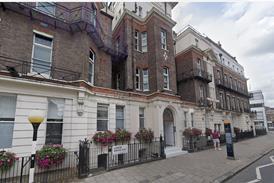Richard Peter Whitehurst
594 comments By Richard Peter Whitehurst
Does open justice require the public scrutiny of others’ dirty linen? That’s all there was here.
No new law. Just a rich man offering his ex-wife a share of some bonds in a trust, which she thought would answer to him, and which, as I read the judgment, he alleged elsewhere were worthless; while at the same selling a boat that he’d been told not to. She was after a lump sum for less, maybe, than she was entitled to, as a quick fix.
Aside from sniggers, what is the point?Anon 5:58. I don’t follow your argument. In this case both parties were rich, and one lost.
Evidence, please.Mr Davis, I doubt that anyone would have asked. Or, printed it.
This case was about a very rich man trying to do down his wife’s reduced claim for a speedy settlement given their respective Agee’s.
It’s all in the refusal judgment, if you read between the lines.Isn’t the appeal finding of an “an affront to justice” in respect of the convicted SPMs the equivalent to not guilty to the criminal standard. I’m asking. The issue was hard fought.
Ignore last line of my longer post. Bad editing.
There seems to me to be a number of strands to this horror show.
1. The drafting of contracts that effectively made the SPMs their PO masters’ underwriters for all losses, however caused. A position demolished in Fraser J 1. The contracts were used to bully the SPMs into submission. Who drafted them?
2. The comprehensive failure of the PO IT system, and its concealment in relation to 1 above, and in relation to
3. The criminal prosecutions, investigated, managed and conducted by the PO. Both were demolished in Fraser J 2. Both to a civil standard.
4. The civil judgments were quoted with approval in the recent criminal appeals. And, after more last minute disclosure from the PO the court’s decision, after a hard fought hearing, that the convictions of those acquitted were an affront to justice destroys any possibility of excuse, or lessons learnt. Who was responsible for this?
5. The historic epidemiological comparison between the pre-IT and post IT cases. The recent appeals indicate 13:1. Startling. Why was this not spotted, or was it suppressed?
So, I think that an enquiry without teeth will not, with the best will in the world, work.
It is now not good enough to have an enquiryAs one who relied on his ushers for 26 years, I can only say that they’re worth more than their weight in gold. They are your eyes and ears on what is going on outside, pick up what’s urgent, and what isn’t in a busy list. And, they cheer you up with any gossip going. And, tell you politely to get a move on if you’re a bit sluggish. Or, let you know if another judge is overrunning and needs help.
Gold plated pensions, well most don’t start until they’re in later years. Some do, and move on to admin.
They are priceless.Anon 24.4 4.30, please read Fraser J’s judgments in the civil actions, and the CA judgment, which is the subject of this article., before sounding off again.
The problem was not one of accountancy failure, but rather of a systemic IT failure, which PO concealed, and defended to the last. It also meant that as investigator - PO police - and prosecutor, the PO was in a position to control disclosure, or suppress it - see my earlier post for a particularly egregious example. In this the obligations of a prosecutor were broken - hence the CA decision.
I’m inclined to agree with your point about the epidemiological numbers. I’m sure that a comparison between the pre-Horizon IT installation prosecution/civil claim numbers and those post it would have thrown up a statistically doubt as to the correctness of its position. The problem was, as I read the judgments, that no one outside the PO knew that there was one, and it wasn’t saying. The civil claims were hardly litigated, and wouldn’t be reported much. The criminal cases would, maybe, be reported locally. So the SPM’s believed that they were alone.
I suspect that there are some very angry CJJ out there at the moment, because they were conned too.This is, I think, the the worst eviceration of a prosecutor’s conduct that I have ever seen. The PO, and I intend no hyperbole, conducted a C21 Bloody Assizes.
It also seems that in the Fraser J (three cheers for him in setting the logs rolling) trials, documents of the utmost importance were not disclosed, even if privilege might be claimed for them.
But even so, evidence was given to him by witnesses who should have seen it. Did they?
With no apology for its length, just read this and seethe:
‘’81. As a result of its review of the many documents, POL disclosed further material which had not been seen by Fraser J but which this court has been able to consider. It includes what has been referred to for convenience as “the Clarke advice” and other documents which were relied upon in the appellants’ submissions before us.
82. The Clarke advice is dated 15 July 2013, but was first disclosed in these proceedings in November 2020. It was written by Simon Clarke, a barrister employed by a firm of solicitors which was instructed by POL in relation to prosecutions. It was written in order to advise POL about the use of expert evidence in cases of alleged crimes by SPMs. Mr Clarke noted that POL generally only prosecuted for three types of offence: theft, false accounting and fraud. He commented that –
“The detection and successful prosecution of such offences is almost always dependant [sic] upon the proper analysis and presentation of Horizon data and accordingly it is imperative that
the integrity and operation of the Horizon system is demonstrably robust.”
He went on to summarise the nature of defences which either made an express assertion that Horizon had failed in some way, or asserted that Horizon must be at fault because the SPM had acted properly and the alleged shortfall was otherwise inexplicable. He also noted that defendants who had pleaded guilty to false accounting or fraud alleged that they had been covering up inexplicable losses. He added that in all these situations defendants often also complained about a lack of training on Horizon and/or inadequate customer support.
83. Mr Clarke then set out the duties of an expert witness, as required by the Criminal Procedure Rules. He summarised the prosecution’s disclosure duties under section 3 of the CPIA.
84. Mr Clarke stated that an employee of Fujitsu, Gareth Jenkins, had provided expert evidence as to the operation and integrity of Horizon. He referred to a number of statements which Mr Jenkins had provided to POL in various cases, attesting to the robustness and integrity of Horizon. Mr Jenkins had ended most of those statements as follows:
“In summary I would conclude by saying that I fully believe that Horizon will accurately record all data that is submitted to it and correctly account for it.”
85. Mr Clarke summarised the statements as Mr Jenkins saying that there was nothing wrong with the system. He continued:
“Unfortunately that was not the case, certainly between the dates spanned by the statements I have extracted here, the 5th October 2012 and the 3rd April 2013.”
Mr Clarke went on to say that Mr Jenkins had been aware of at least two bugs which had affected Horizon Online since September 2010, one of which was still extant and would not be remedied before October 2013, but had failed to say anything about them or about any Horizon issues in his statements. He expressed the firm opinion that if Mr Jenkins had mentioned the existence of the bugs, that would undoubtedly have required to be disclosed to any defendant who raised Horizon issues as part of his or her defence.’’
86. Mr Clarke advised that Mr Jenkins had failed to comply with the duties of an expert witness and should not be asked to provide expert evidence in any future prosecution. We are aware that there is an issue as to whether Mr Jenkins had been used by POL as an independent expert witness, a role which he could not fulfil for the simple reason that he was an employee of Fujitsu. We do not think it necessary to say anything about that issue, because whilst it may be important in other contexts, it does not affect our consideration of POL’s breach of its disclosure obligations. That is because the following conclusions expressed by Mr Clarke are equally applicable whether Mr Jenkins prepared his statements as an independent expert or as an employee of Fujitsu with particular knowledge of Horizon:
“- Notwithstanding that the failure is that of [Mr Jenkins] and, arguably, of Fujitsu Services Ltd, being his employer, this failure has a profound effect upon POL and POL prosecutions, not least because by reason of [Mr] Jenkins’ failure, material which should have been disclosed to defendants was not disclosed, thereby placing POL in breach of their duty as a prosecutor.
By reason of that failure to disclose, there are a number of now convicted defendants to whom the existence of bugs should have been disclosed but was not. Those defendants remain entitled to have disclosure of that material notwithstanding their now convicted status. (I have already advised on the need to conduct a review of all POL prosecutions so as to identify those who ought to have had the material disclosed to them. That review is presently underway.)
Further, there are also a number of current cases where there has been no disclosure where there ought to have been. Here we must disclose the existence of the bugs to those defendants where the test for disclosure is met.”
87. Given that SPMs had been complaining about Horizon for well over a decade, we are bound to say that we find it extraordinary that it was necessary for Mr Clarke to advise in those terms. We commend him for expressing himself as clearly and firmly as he did. But it should not have been necessary for him to have to give such basic advice to a prosecuting authority about its duty in respect of disclosure.”
Please note that by July 2013, the PO knew Horizon had been flawed, and continued to prosecute using it until 2015.
This scandal must no become a short duration news story. Neil Hickman is right.
Root them out.
CPR was, for good or ill, designed to remove, or control, judicial discretion, and to create certainty. Do it right, and it’ll be all right. An old colleague of mine used to say that it was as easy to do things right, as to do them wrong.
When there was wide discretion it was used widely, and wasn’t always consistent. That’s not necessarily good either. And, they were hard to decide.
The current service rules maybe over strict, but until they’re changed, we are stuck with them.
May I suggest that the headline is misleading, and maybe pejorative? The issue had nothing to do with “mercy”?
This case is a whiskery fossil. The litigation issues began probably more than a decade ago. It hiccoughed along until, on the claimant’s application, the court made this order by way of a paper hearing:
“ On 7 April 2020 the court made the following order:
"UPON READING the application of the Claimant dated 24 March 2020
AND UPON reading the witness statements of Mathilda Traill dated 24 March 2020 and 6 April 2020 respectively
AND UPON reading the witness statements of Neil Hunter dated 2 April 2020 and 6 April 2020 respectively
IT IS ORDERED THAT:
1. The period for service of the Claim Form and Particulars of Claim is extended until 10 September 2020.
2. The proceedings shall be stayed from 13 September 2020 to 10 December 2020 to allow time for the parties to comply with the Pre-Action Protocol for Construction and Engineering Disputes.
3. The Defence shall be served by 17 December 2020.
4. Costs of the application are costs in the case.
5. Liberty to apply.
REASONS
(1) The Court has the benefit of witness statements from both parties and this matter can be dealt with on paper to avoid the time and costs of a remote hearing.
(2) The Claimant is entitled to an extension of time for service of the Claim Form and Particulars of Claim, having regard to the difficulties caused by the COVID-19 crisis. The Defendants' suggestion that the Claimant's expert should flout the Government directions to "stay at home unless necessary" is unrealistic.
(3) However, the claims are very old and the Defendants are entitled to expect the Claimant to identify, as quickly as reasonably practicable, the allegations made so that the Defendants understand the case against them and can seek to pass on any claims if so advised. The extended date for service will enable the Claimant to carry out any further investigations by its expert and provide a properly pleaded case.
(4) It is noted that the Defendants have issued protective proceedings against sub-contractors and other potential parties. It is a matter for the Defendant to seek any extensions of time if necessary for it to advance those claims."
That order is clear. It was not appealed. Others outside this case were on the line.
The rules and their application are strict, and I assume well known.
Sadly someone slipped up. Sad, but we’ve all been there, or very lucky. The judgment is correct, to do otherwise would be to create a shelf of books on “Mercy, and its application.”
The use of words such as “chicanery” and judicial “box ticking” and others to attack a judge properly applying the rules is, to be blunt disgraceful. She may be wrong, but having read her judgment I don’t think she is, then they can appeal.Oh, and I should have added that, as I read it the teams will play S/L midweek, and in their home leagues at weekend. I can’t see how this will be possible without two separate squads, which will likely infringe local maximum wage rules, and break the obligation to field your best side if they are separated entirely.
As I support Stoke City this problem is in all respects out of my league.
Nevertheless I assume that our 6 breakaways (and the others) have some legal relationship with UEFA and/or FIFA in the continental and global governance of the sport. Probably, their home set ups as well. They’ll have signed up to something. The issue will be if and how they can rid themselves of their obligations, if any. Hence the lawyers.
They might all decide to register their companies in the USA for example. So no longer English, Spanish etc. Does/can FIFA expel the USA if they do?
The more difficult problem will be for the floating 5 teams which are to make up the 20 team league. If they’re removed, will their local leagues/national body let them back in? Let alone player sanctions.
This all looks like an incompletely thought out scheme, which is to be used in some financial arm wrestling down the line.Anon 12.13. I’ve seen advertisements for such claimants to come forward. A bit like the Woodford one, I mentioned earlier.
Surely, that is enough?Oddly a ‘’Have you lost money with Woodford” come on was flashing above the LSG masthead as I typed my earlier note below.
I assume in providing their supposed increased access, the solicitors involved will purchase one way or another my email or home address. How is that giving me access to justice? Rather, it is giving them access to me, and you can bet that they won’t give up once they have a toe in the door.
It’s touting. And, it’s wrong.
I do not believe that with the level of advertising these days, no one does not know enough to make a claim, and how to contact a lawyer.11.16. The defendant wanted a proper trial, and he wanted it on Facebook initially to accommodate the crowd. Sure, there seems to have been a procedural mixup, I’m not sure who was responsible. But, the parties could have agreed to remedy it.
It also appears, that despite an order to do so, he did little or nothing to tidy up his prolixity.
I’ve never said I agree the level of costs, despite the documentary and other evidential prolixity, but I wasn’t there.Before making any adverse comments about the judge and his decision on costs - or their amount, please read the original judgment, there is a link to it in this one, and then read this one.
The defendant is no stranger to, and is experienced in conducting litigation, and seems to fight his corner in person. He also seems to play hardball with his opponents.
He needs no one’s sympathy.Mr Melling makes a good point, but maybe cites an unreliable example.
If I’m burgled in a classic housebreaking, I’m a victim of burglary. However, if I’m assaulted, and my attacker raises self defence, then it is possible that they are the victim. It all depends.
This goes to show that, to make a blindingly obvious point, criminal - and most other trials - turn on their specific facts in issue, and the findings on those facts made by the relevant tribunal.
Referring to those involved by their proper names solves most problems.
That said keeping both sides apart isn’t a bad idea. Anxiety can affect anyone. And, provided all involved can have their statement to hand if needed, that isn’t either. It’s use - overuse - may be a matter forvcomment, and, if so something for the tribunal of fact to weigh in the balance. Evidence giving isn’t a test of who has the best memory.
I cannot think of any other testing or examination regime with a 100% pass record.
Other places with the brightest and the best students [Oxbridge?] don’t achieve that. 90% plus maybe, but not 100%.
Similarly, 25% seems odd to me.
Given the fees to be paid, prospective students should be given the full lowdown. But, won’t the SQE sort a lot of this out?


































Commented on: 7 May 2021
£100m divorce award: judge rebuffs media pleas to publish judgment